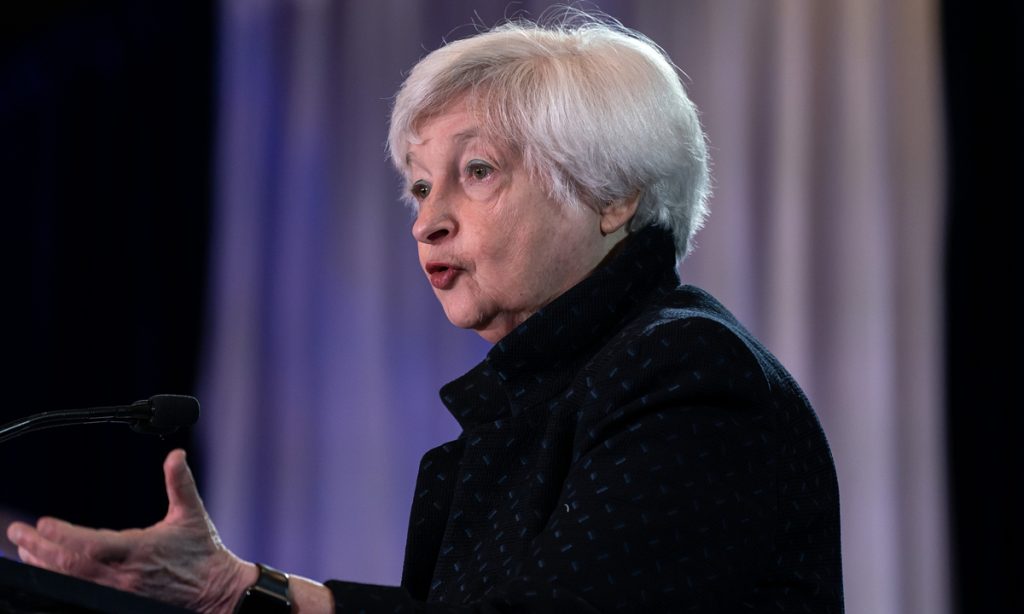Experts urge US to approach China's capacity issue objectively for positive results ahead of Yellen's upcoming visit

US Treasury Secretary Janet Yellen will visit China from April 4 to 9 and is scheduled to discuss a number of macroeconomic and financial issues between the two countries during her meetings with top Chinese government officials. The visit is seen as a positive sign by both sides to seek consensus amid stabilizing China-US relations that have seen growing negative factors in recent months.
The announcement of Yellen's visit to China followed a phone call between Chinese President Xi Jinping and US President Joe Biden on Tuesday at the request of the latter.
The Chinese side welcomed scheduled visits to China by Treasury Secretary Yellen and Secretary of State Blinken , according to Xinhua News Agency. It will be Yellen's second-in-person visit to China as the Treasury Secretary, after a visit in last July.
Chinese experts view the upcoming visit by Yellen in a positive light, and expressed hope that the visit could foster consensus built on the San Francisco vision articulated last November, despite the US' crackdown on China in the technology field, tariffs on Chinese imports and rising nontariff barriers.
During his phone call with Biden, Xi pointed out that the US side has adopted a string of measures to suppress China's trade and technology development, and is adding more and more Chinese entities to its sanctions lists, according to Xinhua.
This is not "de-risking," but creating risks, Xi said. "If the US side is willing to seek mutually beneficial cooperation and share in China's development dividends, it will always find China's door open; but if it is adamant on containing China's hi-tech development and depriving China of its legitimate right to development, China is not going to sit back and watch."
According to a press release posted on the US Department of The Treasury website on Tuesday (US time), Yellen's visit will include stops in Guangzhou, capital of South China's Guangdong Province and Beijing.
In a visit that "will build on the intensive diplomacy she has engaged in to responsibly manage the bilateral economic relationship," Yellen will meet with Chinese Premier Li Qiang, Vice Premier He Lifeng, Finance Minister Lan Fo'an, People's Bank of China Governor Pan Gongsheng and other officials from Beijing and Guangdong, the press release said.
Yellen will discuss issues including what the US claims are China's unfair trade practices and industrial overcapacity, bilateral cooperation on countering illicit finance and climate change, according to the press release.
"There are reasonable expectations for Yellen's visit to build on the consensus reached by the two side since last November," Gao Lingyun, an expert at the Chinese Academy of Social Sciences, told the Global Times on Wednesday.
Gas said among the many objectives listed by the US' press release, Yellen's focus will most likely be on financial stability, a core concern of the Biden administration.
Gao noted that as the global price of gold soars, China has more options in the management of its assets portfolios and this could affect China's holding of US Treasury bonds.
The expert said that one meeting alone could not iron out all the differences between the two countries but "it is hoped that the incoming visit by Yellen could help address the core concerns of the two sides, which have been articulated by the two presidents in their phone talks, to a certain extent to meet mutual interests."
Chinese analysts believe the US needs to stop using bilateral meetings to push for its unilateral agenda, as this will reduce the likelihood of positive results from the "positive" dialogue.
According to Reuters, a US Treasury official told reporters that Yellen during her upcoming China trip would "make clear the global economic consequences of Chinese industrial overcapacity undercutting manufacturers in the US and firms around the world."
"The US should view China's capacity issue from an objective point of view, as China's production capacity is determined by global market demand, its efficiency and the scale of its vast domestic market," Li Yong, a senior research fellow at the China Association of International Trade, told the Global Times on Wednesday.
"To label it as overcapacity would be a stray from facts, if not an ill-intended campaign to smear China following the de-risking theory," Li said.
Li noted that the US has a number of domestic financial issues to address, including inflation and rising debt levels.
US national debt, at $34 trillion, is almost equal to the combined value of the economies of China, Germany, Japan, India and the UK, Li said, citing data.
The US has maintained its crackdown tactics on China in the technology sphere, with newly updated exports control rules that will come into effect on Thursday and expanding the restrictions to laptops containing AI chips.
China's Ministry of Commerce on Tuesday strongly rejected the US' National Trade Estimate Report on Foreign Trade Barriers, which listed China as the country of "primary concern."
Despite Western media hype claiming that China is losing attractiveness to foreign investors, executives from a large number of top US firms come in flocks to China last month, pledging their commitment to the Chinese market, announcing new investment deals and setting up new shop or factory floors.